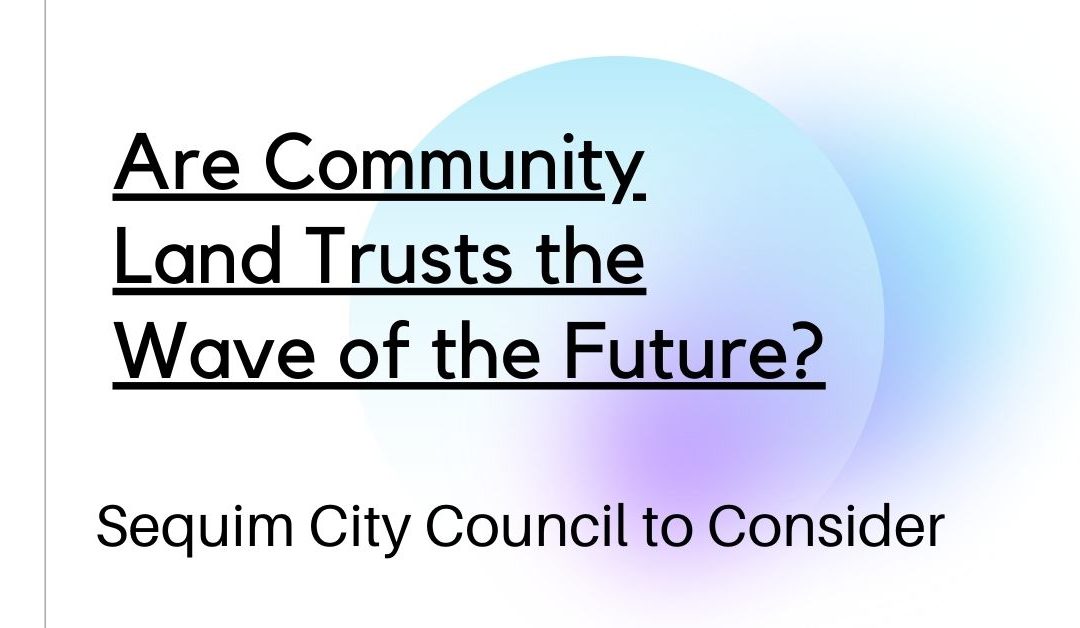Editorial by Citizen Review Staff
During the May 10, 2021 Sequim City Council meeting, a discussion took place among the city council members (Sarah Kincaid was absent) about how to bring more affordable housing in Sequim. City Councilman Brandon Janisse promoted the idea of creating a “community land trust” as a way to create “affordable housing”. After discussion, he made a motion which he read from an obviously pre-written statement, to “direct staff to bring back to council a list of acceptable properties for land bank strategy within the city limits.”
Despite several councilors stating they would rather wait, as they didn’t understand what a land trust was or what the ramifications might be, the motion carried unanimously. Janisse managed to take the issue from the discussion – about “community land trusts” – to a “land bank strategy” with his actual motion. These are two different terms, and worthy of investigation about what they are, and what they would accomplish.
With the motion, Janisse suggested “quick” action to help solve the housing issue.
Since there are questions about what a “community land trust” or “CLT” is and how it would work to help with housing, we did some extensive research.
We found that under a Community Land Trust:
- The private property to be purchased by city government or “the community” would be “in perpetuity” – forever removed from private property ownership, becoming instead, “community-owned” property, or “communal” property – a socialist program.
- “The community”, according to CLTs already in place, usually consists of ⅓ of the people who buy the building or portion of the building in the case of multi-family units, ⅓ of the owners of the land beneath; and ⅓ by bureaucracies from various governmental and/or nongovernmental agencies.
- The land is separated from the buildings constructed on it, creating a “leasehold” interest for the purchaser. (Land usually rises in value, while buildings usually depreciate.) If/when the purchaser sells their interest, they are limited by the initial agreement to only a certain amount at the sale; the balance would go to the community trust.
- The purchase of the land by the government or a community trust can be through taxpayer-funded grant money. “local, state, and federal governments can support and expand community land trust activities by removing regulatory barriers.
- There are reported problems with CLTs from areas that have instituted them, including the complexity involved, bureaucratic oversight, and how the continuing funding to keep the payments “affordable” would be achieved.
- One of the drawbacks expressed by proponents of CLTs is that the idea of privately owned property is deeply held by Americans, and the Constitution would need to be amended to change it. A revealing statement made by Mary Houghton, Co-Director of Burlington Community Land Trust, who says, “I think private ownership of the land is a really bizarre concept. It makes no sense. It makes no more sense than private ownership of water.”
According to an article in Shelterforce – “The Original Voice of Community Development”, “Land banks are public entities, usually public nonprofit or governmental entities, which specialize in the conversion of vacant, abandoned and foreclosed properties into productive use. Typically, land banks are granted special powers via state enabling legislation. These powers include the ability to remove legal and financial barriers, such as delinquent property taxes, that often render vacant and abandoned properties inaccessible or unattractive to the private market. Land banks acquire properties through different means, but the most common pipeline is the property tax foreclosure system.” The federal Department of Housing and Urban Development (HUD), says basically the same thing.
A more comprehensive article about community land trusts and land banks, with sources, can be read here: What are community land trusts and land banks?
Tom DeWeese did a good job of stating the case for private property ownership:
“John Locke advocated that if property rights did not exist, then the incentive for an industrious person to develop and improve property would be destroyed; that the industrious person would be deprived of the fruits of his labor; that marauding bands would confiscate, by force, the goods produced by others; and that mankind would be impelled to remain on a bare-subsistence level of hand-to-mouth survival because the accumulation of anything of value would invite attack.
“One only has to look to the example of the former Soviet Union to see clearly what happens to a society when an outlaw government exercises brute force to take control of private property. Under that tyrannical government, each of Locke’s predictions came true there.
“Private property ownership is much more than a house. It is the root of a prosperous, healthy, human society based on the individual’s freedom to live a life of his own, gaining from the fruits of his own labor. Take that option away and the people always react the same way. They stop producing.”
Government should not be in the land buying, developing, and selling business.


Recent Comments